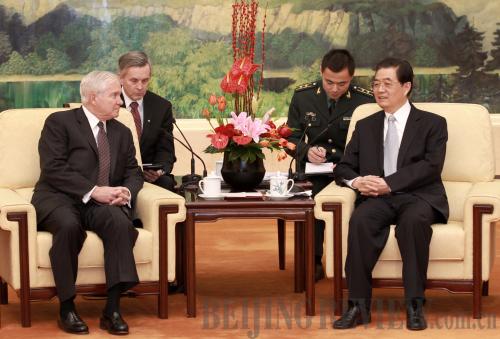|
 |
|
BETTER UNDERSTANDING: Chinese President Hu Jintao meets with visiting U.S. Defense Secretary Robert Gates in Beijing on January 11 (PANG XINGLEI) |
U.S. Defense Secretary Robert Gates' recent visit to China served to warm up China-U.S. military relations. The hope is that the visit will pave the way for the two countries to eliminate suspicion, strengthen mutual trust and conduct sincere cooperation, analysts said.
Gates' trip marked a re-launching of military ties between the two nations and provided a good opportunity for them to improve ties, said Pang Zhongying, a professor with the School of International Studies at Renmin University of China.
Restoration
The trip, from January 9 to 12, marked the official restoration of military contact between the two countries, which was suspended early last year after the United States announced a $6.4-billion arms sales package to Taiwan. It came a few days ahead of Chinese President Hu Jintao's state visit to the United States and was Gates' second trip to China since taking office in December 2006.
Talks would help promote healthy military ties between China and the United States, said Chinese National Defense Minister Liang Guanglie at a press conference in Beijing, after a meeting with Gates.
During the visit, Gates held talks with President Hu and Vice President Xi Jinping. He also met General Xu Caihou, Vice Chairman of China's Central Military Commission—the country's top military body headed by President Hu—and Foreign Minister Yang Jiechi.
A highlight of his China trip was a visit to the headquarters of the People's Liberation Army's (PLA's) Second Artillery Force. He became just the third senior U.S. official to visit the headquarters in its 45 years of existence. Gates also spoke with Commander Jing Zhiyuan of the PLA Second Artillery Force, in an effort to learn more about China's strategic missile development.
Gates' visit was important, mainly due to the tension-easing effect that it had on China-U.S. military relations, which have been tense since the beginning of 2010.
"The visit to China by Gates is the most important step taken to date by the two sides to move toward fully restoring contacts between the two defense establishments," said David M. Finkelstein, Director of China Studies and Vice President of the Virginia-based Center for Naval Analyses.
In January 2010, the United States announced plans to sell $6.4 billion in weapons, including helicopters and missile defense systems, to Taiwan. This drew strong objections from the Chinese Government. In the wake of the announcement, China delayed a series of military exchange programs, including Gates' visit to China and the exchange of visits between the Chief of General Staff of the PLA Chen Bingde and Chairman of the U.S. Joint Chiefs of Staff Mike Mullen.
However, dialogue and consultation between the two major powers never ceased. Since the summer of 2010, the two sides have been moving cautiously to restore contact and resume important high-level meetings; this included the 11th round of China-U.S. defense consultations that took place in December 2010 between Deputy Chief of the General Staff of the PLA Ma Xiaotian and U.S. Under Secretary of Defense Michele Flournoy.
| 